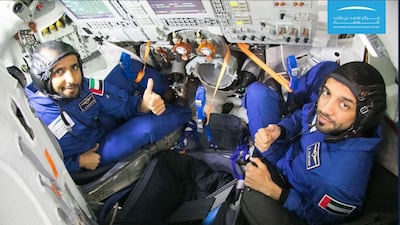Astronauts at the International Space Station orbit the Earth every 90 minutes. This means they will witness a staggering 16 sunrises and sunsets every day.
So how will the UAE’s first Emirati astronaut, who is a Muslim, pray five times a day and figure out which way is Makkah?
The answers can be found in a prayer booklet issued by Dubai’s Islamic Affairs Authority who have recommended Hazza Al Mansouri follow the timings of the holy city of Makkah in Saudi Arabia.
Muslims must pray five times a day at times dictated by the height of the sun. When aboard a station orbiting the Earth at 27,500kph, which direction must Maj Al Mansouri face when expressing his faith?
“Astronauts in space witness 16 sunrises and 16 sunsets a day, so it becomes unclear when they could pray or fast,” said Dr Mohammed Al Ahbabi, director general of the UAE Space Agency.
Malaysian astronaut Sheikh Muszapher Shukor, who travelled to the ISS during Ramadan in 2007, faced a similar dilemma. As a devout Muslim, he wanted to pray on time while facing Makkah.
“When Sheikh Muszapher Shukor visited us in 2015, he told us how before his trip he was asking how he could pray on time while in space,” said Dr Al Ahbabi.
Malaysia’s space agency Angkasa convened a summit that included 150 Islamic scholars to answer questions concerning qibla directions and prayer timings.
“He told us he was issued a fatwa to follow the prayer timings of the location of the launch, which was Kazakhstan.”
Maj Al Mansouri will also be heading to space from Kazakhstan but has been advised to prioritise following the prayer timings adhered to in Makkah.
The booklet described it as “the most suitable” time for prayers and fasting for astronauts visiting the ISS — of all the options.
Makkah’s timings are more favourable than Kazakhstan because Maj Al Mansouri will not remain above the central Asian country for the duration of his 8-day space mission.
“Since it [the capsule] will detach from Earth, and will be rotating around it very fast, and in different routes, there is no point of following the timings of the launch country, and Makkah as the land where the revelation [message of Islam] was inspired, takes precedent,” the booklet read.
It said that space travel does not absolve a Muslim of their mandatory prayers and fast during Ramadan “so it is important for the astronaut to know their timings”.
The booklet also advised that Maj Al Mansouri attempt to face Earth while praying but if it is too difficult, and he risks missing a prayer, he should pray in any direction.
Before praying, Muslims must perform ablution — a ritual of washing the hands, face, neck and feet.
The booklet said that the ISS provides water among other daily necessities but advised astronauts to take with a grain of sand or a stone that can act as a replacement for water in ablution when water becomes unavailable.


